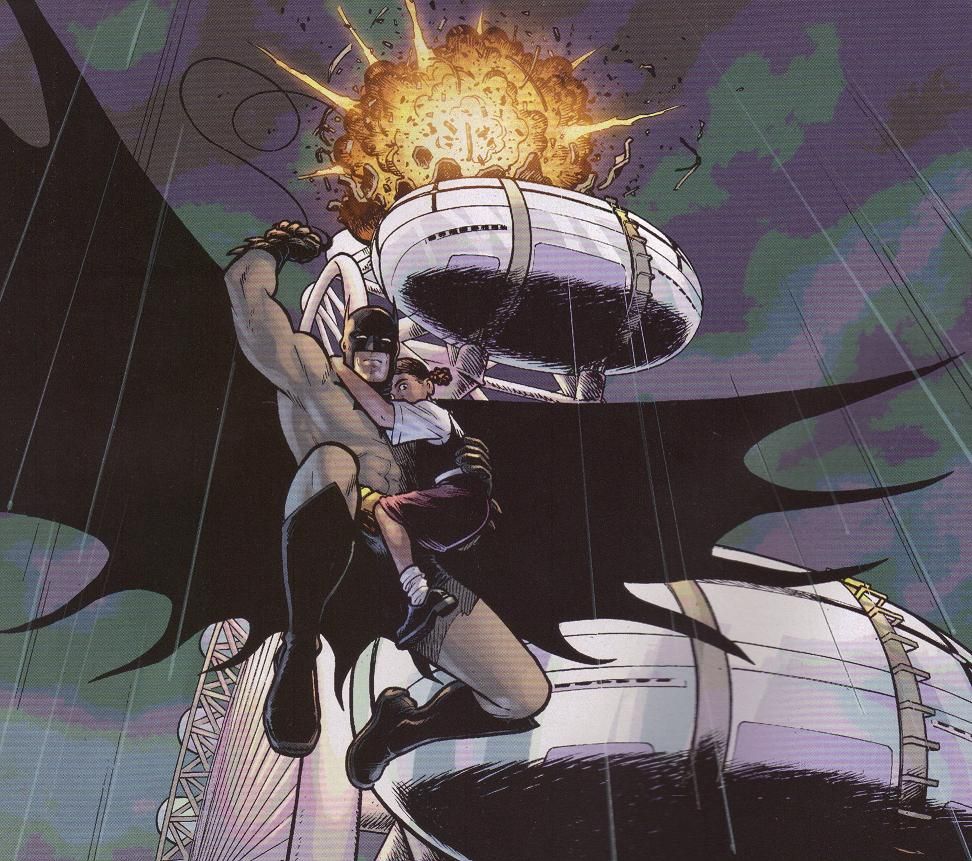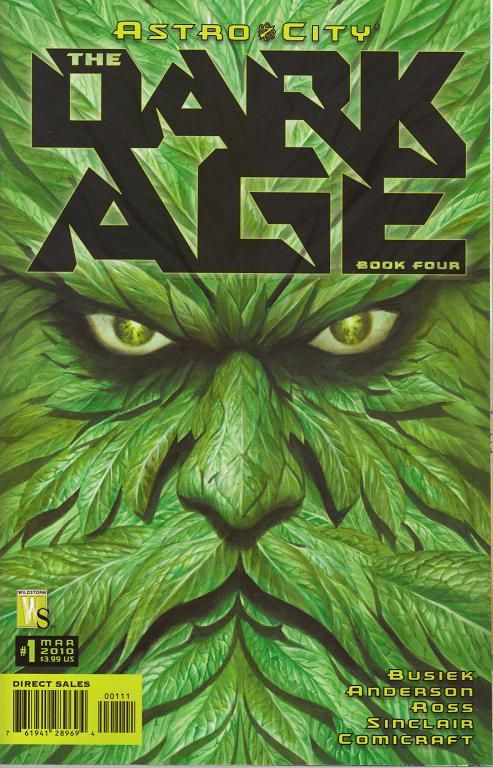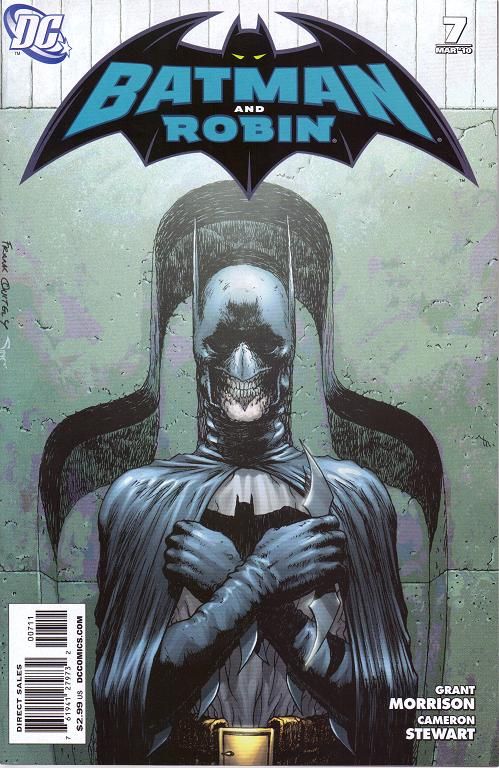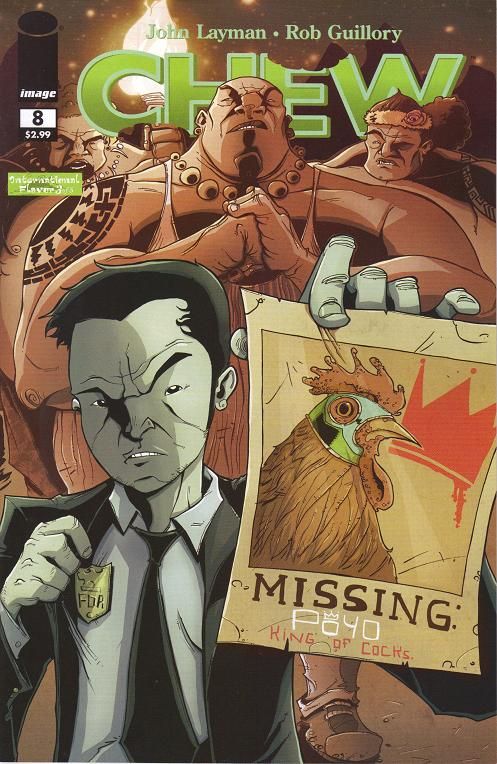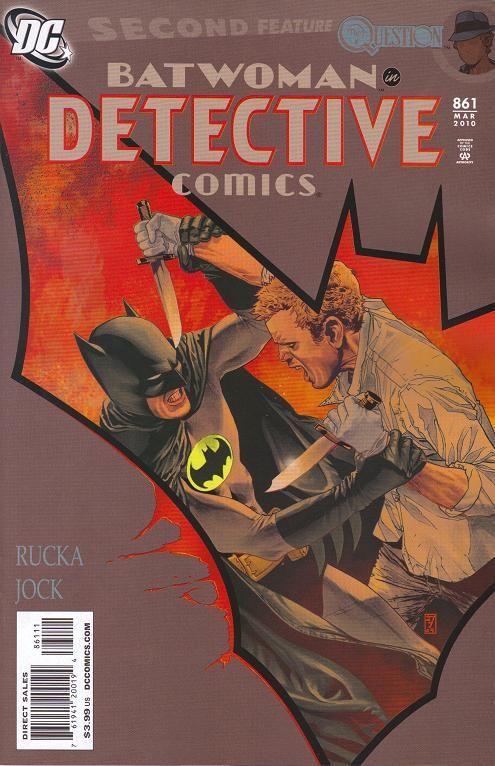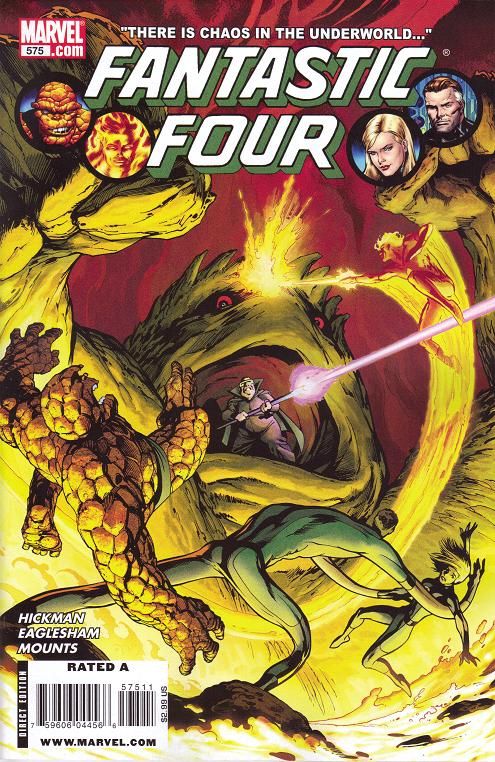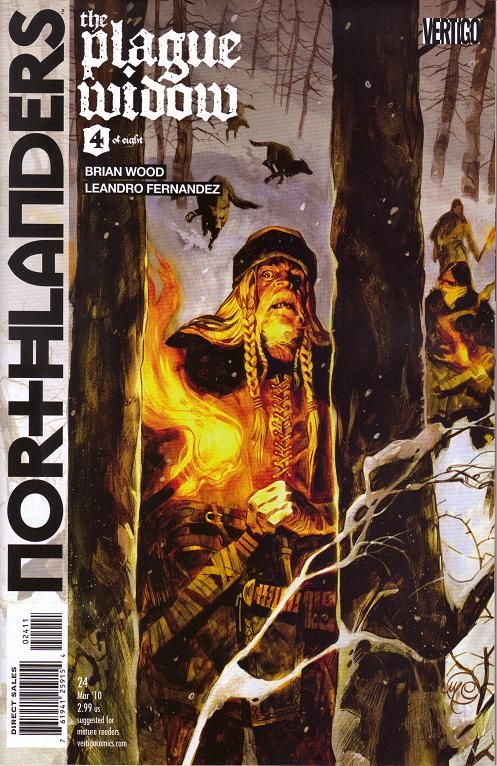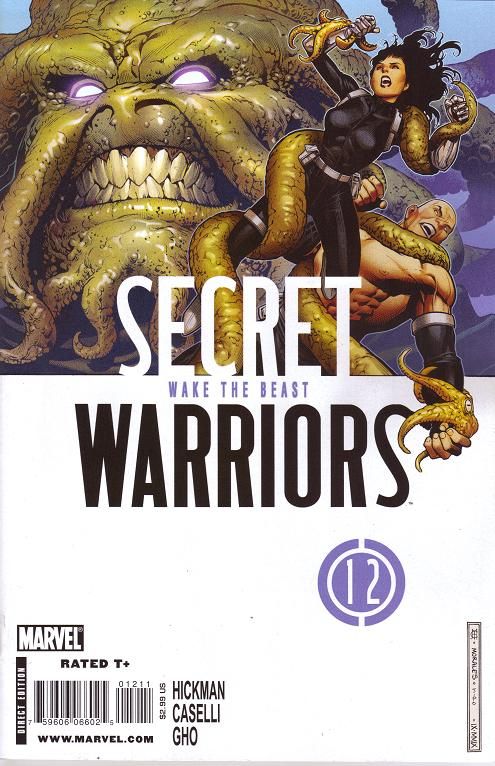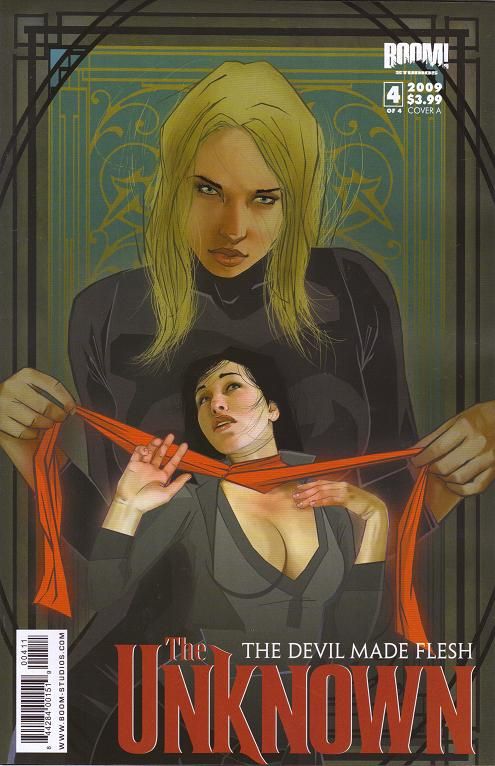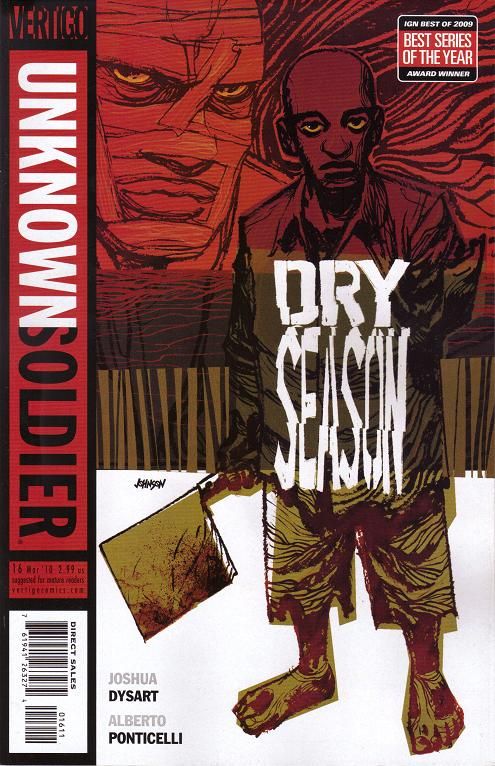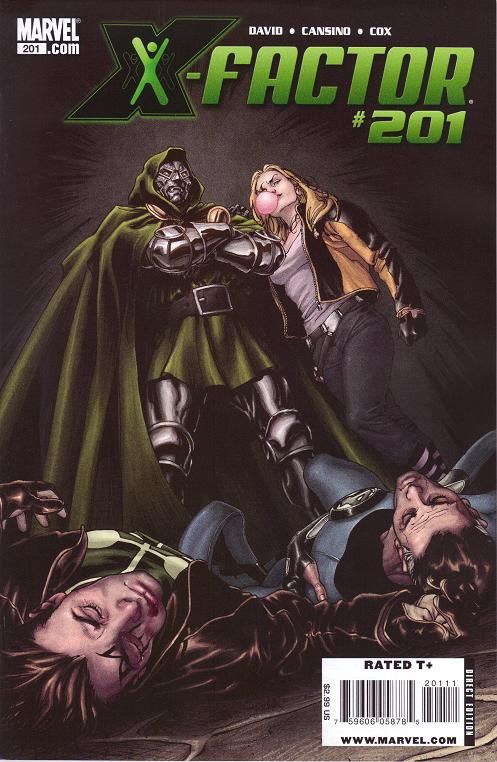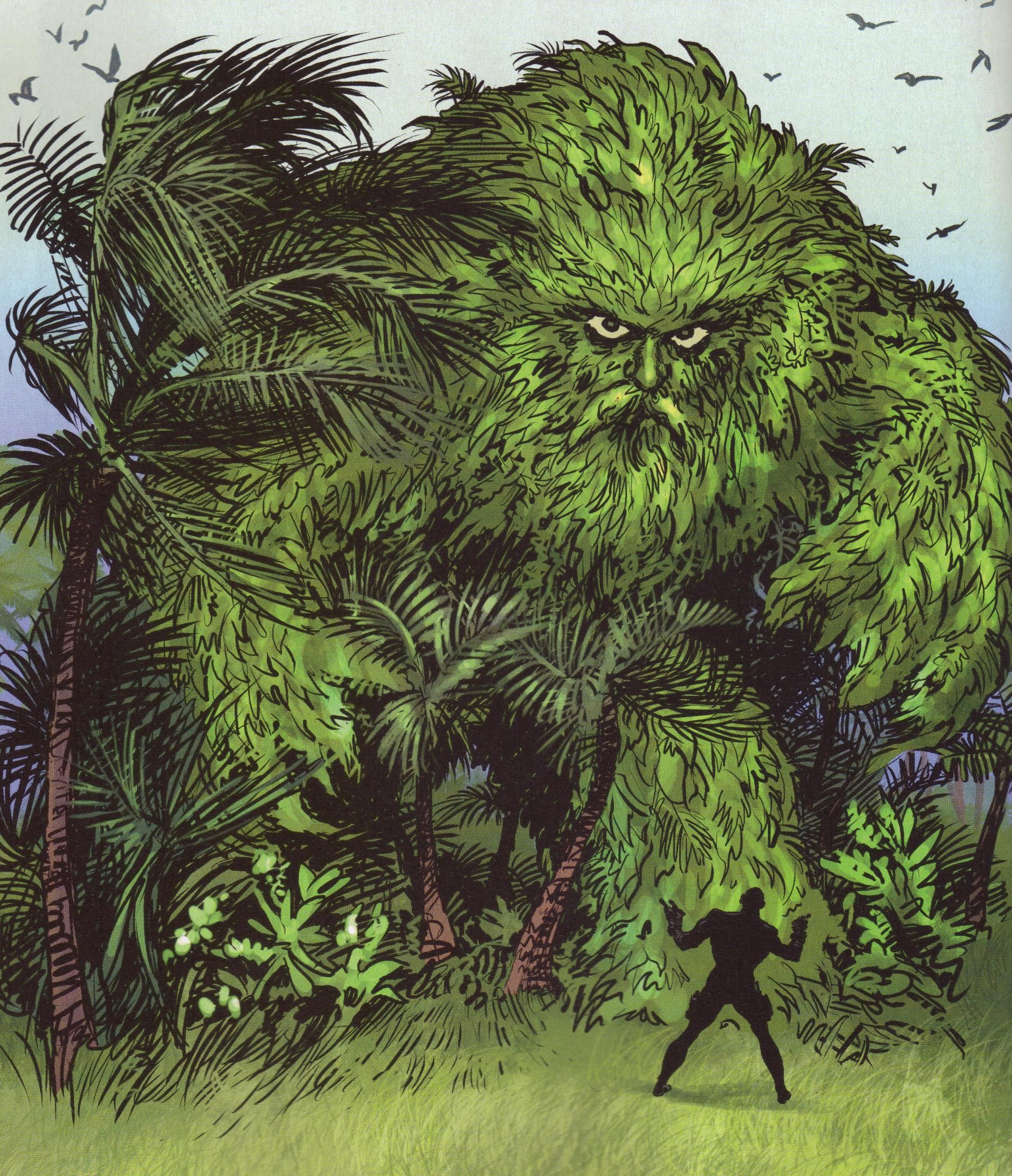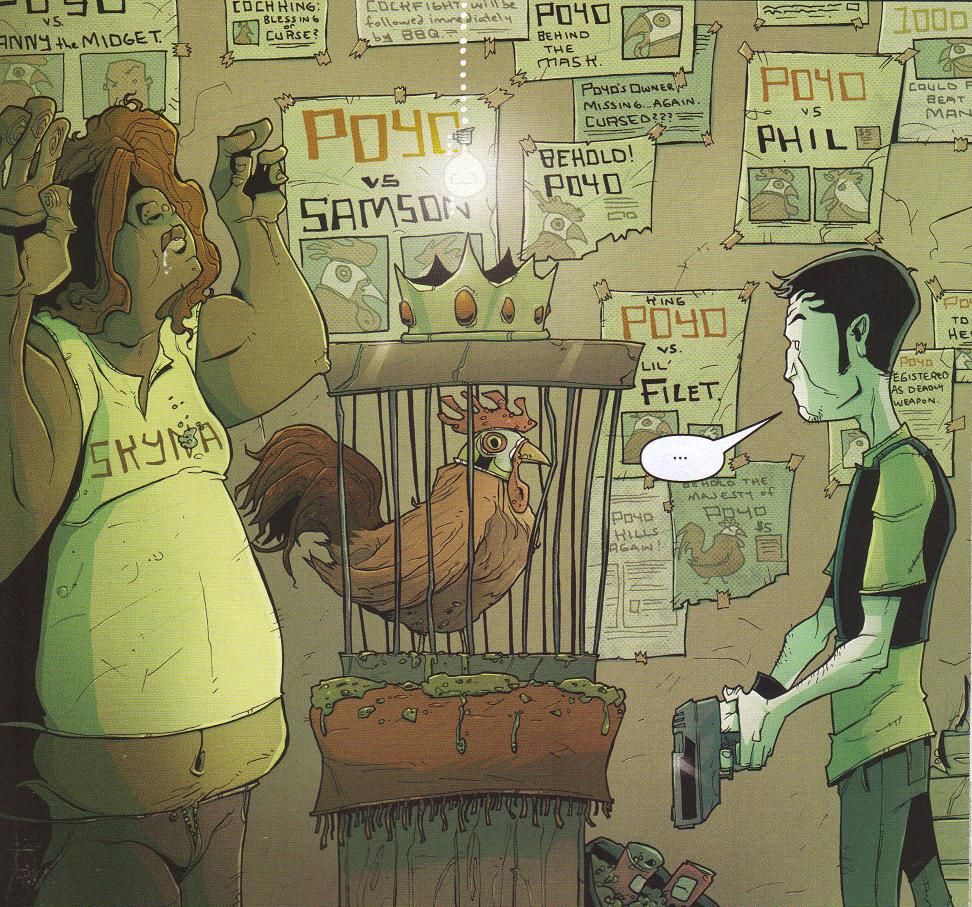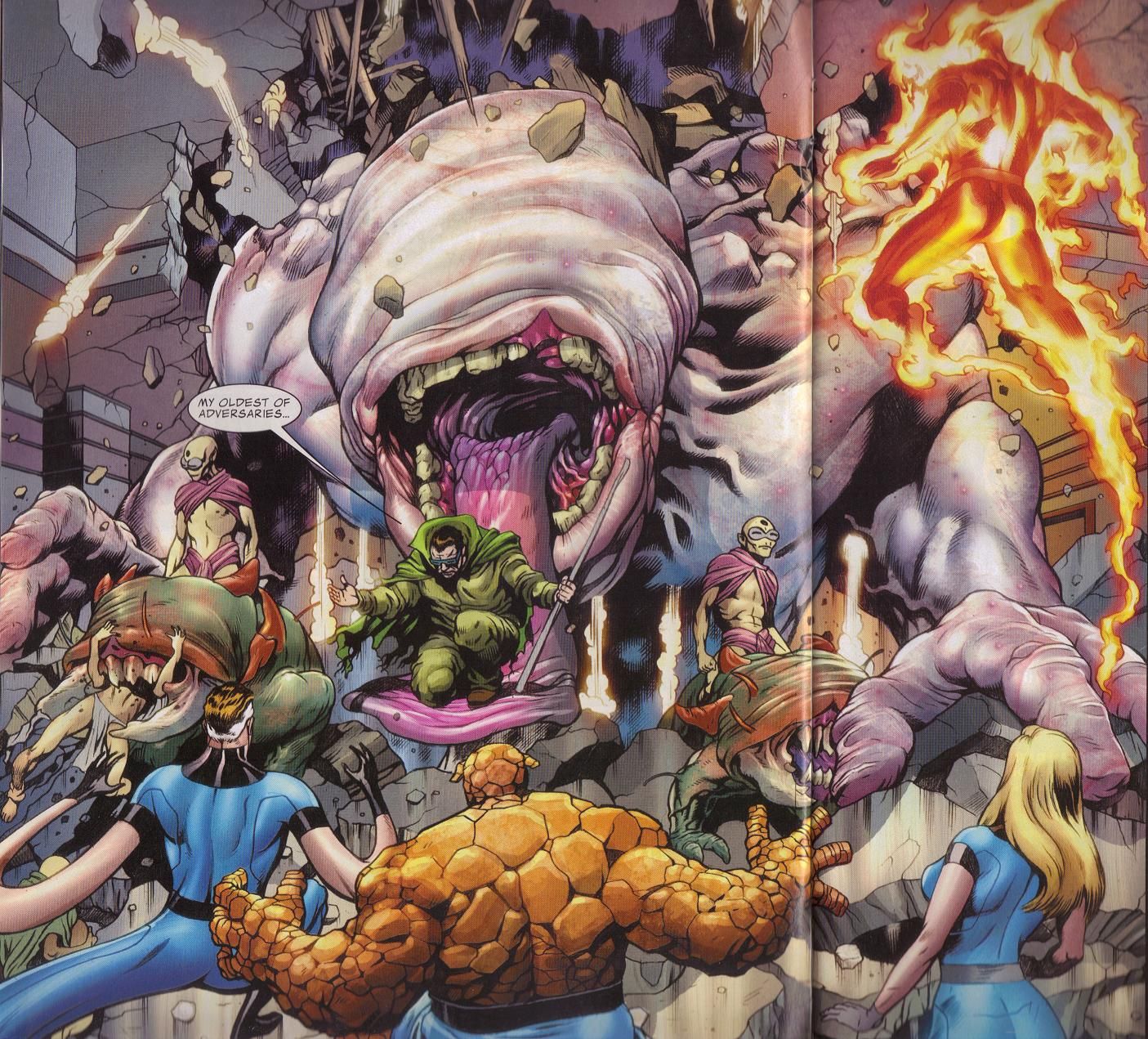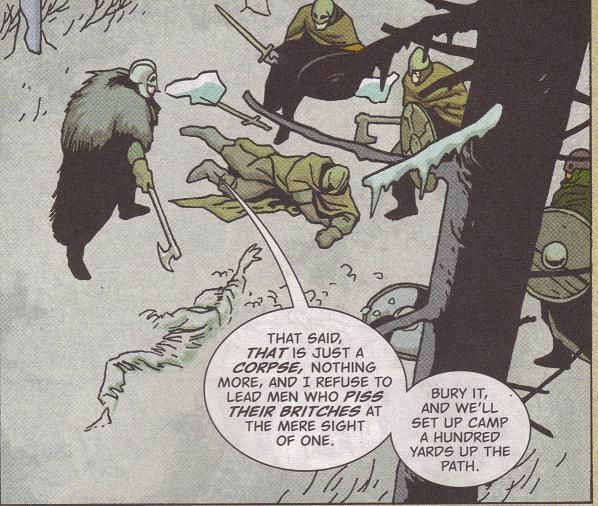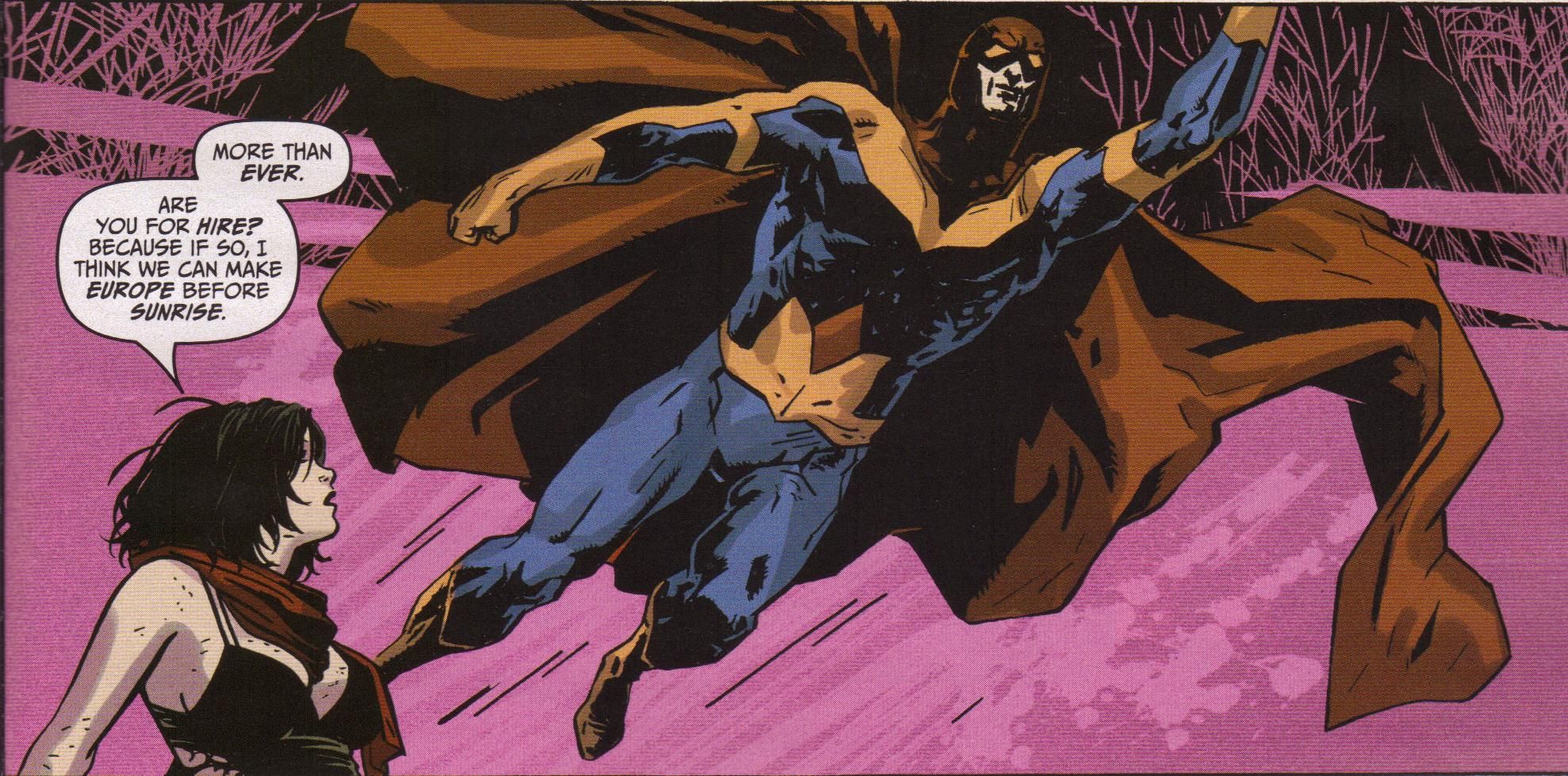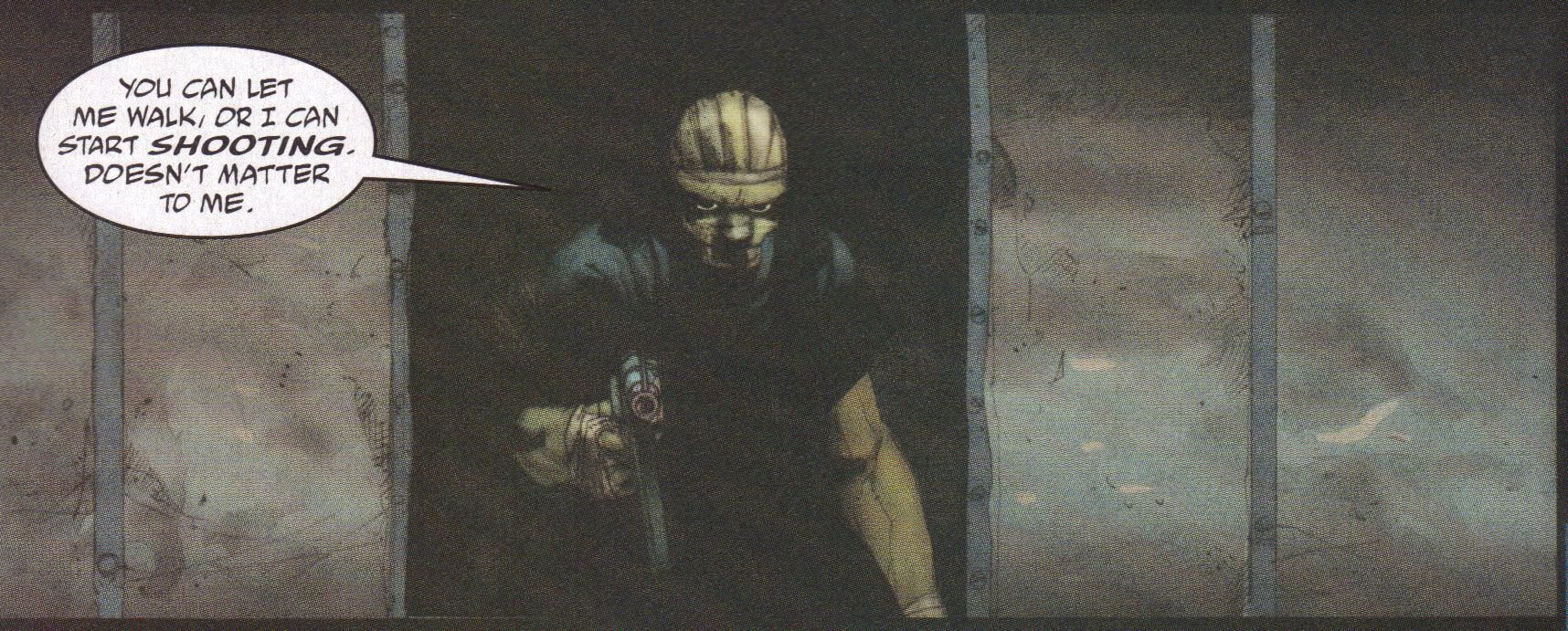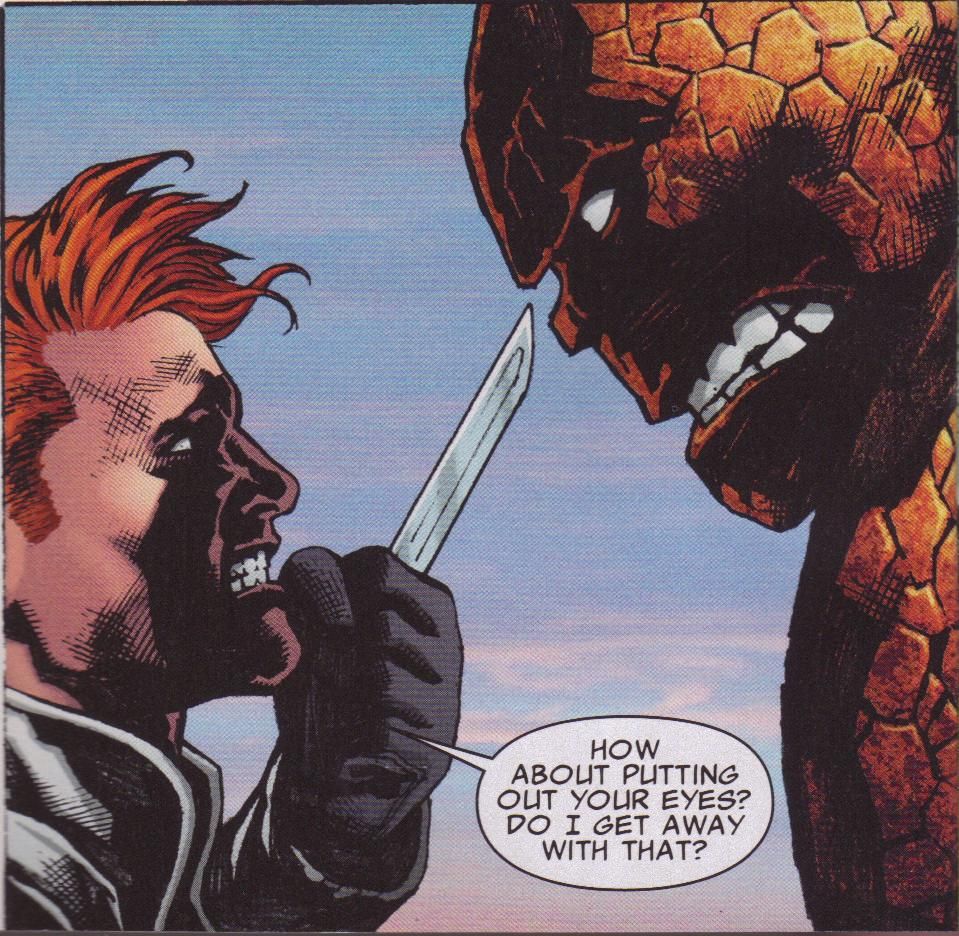"The more civilized we become, the more horrendous our entertainments," Frex said. (Gregory Maguire, from Wicked)
Astro City: The Dark Age Book Four #1 (of 4) ("Vengeance is Mine") by Kurt Busiek (writer), Brent E. Anderson (artist), John Roshell (letterer), and Alex Sinclair (colorist). $3.99, 24 pgs, FC, DC/Wildstorm.
There's not much to say about this particular issue of Astro City that hasn't been said about every issue of Astro City. Fifteen years in, I'm probably not going to convince you to pick it up if you haven't already, although it continues to be an excellent comic. The Williams brothers' quest for vengeance on the man who killed their father continues into the 1980s, and the Silver Agent's tale is somehow involved, which is nice. I want to point out, however, that I'm not sure what their plan for revenge is. Do they want the murderer to suffer? Because if they just want him dead, then Royal pulls a classic "James Bond villain" mistake in this issue. He could easily kill him, but he talks instead, letting the guy escape. I have to believe he only wants him dead, because he smashes into a heavily guarded facility with seemingly no plan to leave with him, so why not shoot him? Oh, Royal, you screwed up. Maybe Charles wants to be in on the kill as well, but if so, maybe they should both crash in on the facility. I don't know. It just seems like a lame excuse to force the series to continue. Busiek hasn't really told us what the Williamses plan to do with him, so I guess we're supposed to assume they want to kill him slowly. If so, Royal had the perfect opportunity to tell him (and us) that he was taking him away, so his foolishness in letting the bad guy escape is at least understandable.
Anyway, it's Astro City, which means it's quality entertainment. And yes, that's the Busiek-verse's answer to Swamp Thing on the cover. Will it capture Mike Sterling's heart like the original has? I doubt it. Still, he's keen. Because he's a plant with a moustache. Yes, that's keen.
One panel of awesome:
Batman and Robin #7 ("Blackest Night Part One: Pearly and the Pit") by Grant "Like I care what MarkAndrew says about me!" Morrison (writer), Cameron Stewart (artist), Alex Sinclair (colorist), and Pat Brosseau (letterer). $2.99, 22 pgs, FC, DC.
As much as I didn't loathe Philip Tan's work on this comic, it's still a relief to see Stewart, mainly because Stewart is really, really good. I still wonder why Morrison seems more Morrisony when he's teamed with a good artist - that's weird. The script shouldn't be that influenced by the artist, should it? I'm talking about the actual dialogue - there's no reason why Stewart, for instance, should make Morrison give us the nifty dialogue between the jailer (or, this being a veddy British comic, should that be "gaoler"?) and Batman or the dialogue between the Pearly King of Crime and Bats. But it sparkles in a way that the dialogue in the previous three issues didn't. I don't know enough about Morrison's process to know how he writes, but while I can understand how the action scenes are choreographed better when he has a better artist, I don't get why his dialogue seems to work better when he has a good artist, too. Strange.
While the dialogue in this book is very keen (I just love all the British supervillains that the God of All Comics throws out casually), the overall issue isn't great. Without even getting into the fact that we know Bruce Wayne won't be resurrected in this comic (although I suppose this could somehow lead into Morrison's mini-series that brings him back), it's still kind of disjointed. I know we're supposed to trust our Great Bald God that everything will work out, but although I enjoyed this issue (mainly for Stewart's art and the scenes before the end), it's still a weirdly unexciting issue. Batwoman's sudden appearance doesn't help, because it's such a weird place for her to show up. She doesn't know she's in England? Really? Bizarre.
But man, that glorious first action sequence is something, isn't it? And if that's not Michael Morice from Justice League Europe as the Queen's Jailer, I'll be sad. And I guess Batwoman is referring to Final Crisis at the end, right? Nice to know Morrison, at least, is still referencing that, even if no one else is. And I know the word balloons on page 19 are reversed, but I wish what each character is saying is really what Morrison meant for them to say. That would turn this book into a surreal masterpiece.
One panel of awesome:
Chew #8 ("International Flavor Part 3 of 5) by John Layman (writer/letterer), Rob Guillory (artist/colorist), and Lisa Gonzalez (color flatterer). $2.99, 22 pgs, FC, Image.
It's the dreaded middle issue in a five-issue arc, which usually means everything slows down in between the insane opening and the hellacious climax, full of useless padding because the writer wants to fit it into a decent-sized trade. Man, I'm bitter, aren't I? Layman avoids that to a degree, as there is less insanity and not a ton of hellaciousness in this issue, as Tony gets a bit sidetracked from his principal mission. He does, however, get to find out where a champion cockfighter is being kept, which is kind of fun. What makes the issue work is Guillory's tremendous art (no surprise there) and the fact that Layman is getting better and better as a scripter, so the fact that the plot feels a bit trifling (Poyo will be back, claims the letters page, but not, it seems, in this story arc) doesn't detract from the enjoyment of reading this. We get the return of a much beloved character (yes, after only 8 issues, this comic has beloved characters), a fun stand-off between Tony and his sheriff ally and some bad guys, and a fantastic final page that kickstarts the main plot once again. It's the kind of thing that makes this such a fun book - I won't give it away, but Guillory's final page is stunning, and it shows once again that Layman is doing a really good job with plotting the book - I cannot wait to read issue #9. But Tony really has to work on his anger management issues, doesn't he?
I'd like to point out that Layman's cat died this week. If he's reading this at all, I'd like to offer my sincere condolences. We've lost two cats in the past few years, and it's always difficult. I hope he feels better.
One panel of awesome:
Detective Comics #861 ("Cutter Part 1 of 3"/"Pipeline Chapter Two Part Two") by Greg Rucka (writer), Jock (artist, "Cutter"), Cully Hamner (artist, "Pipeline"), David Baron (colorist, "Cutter"), Dave McCaig (colorist, "Pipeline"), Todd Klein (letterer, "Cutter"), and Jared K. Fletcher (letterer, "Pipeline"). $3.99, 30 pgs, FC, DC.
J. H. Williams leaves the book (to work on a Batwoman ongoing, apparently) and Jock takes over, so we'll see how that affects the praise of the book. When I didn't list Detective as one of the best ongoing series of 2009, I did so because I just didn't think Rucka's writing was that strong. I'm more interested in writing than in art (I've gotten much more interested in art in the past few years, but I'm still a writing guy), and I just didn't think Williams' stunning art overcame the writing, which certainly isn't bad, but isn't anything great. Rucka's writing on Stumptown, for instance, is better than that on Detective. It's the same reason I didn't have Asterios Polyp on a "best-of" list - was the art so, so brilliant that it overcame a fairly pedestrian story? Not to me. Your opinion may be different, of course.
So now that Jock, who is a very good artist but perhaps not as excellent as Williams, is on the book, what can we say about it? Well, we can say the same thing about it that has been true since Rucka started on the book again: It looks very good, but the story is fairly standard. Jock isn't quite as astonishing as Williams, but he puts together a page very well, and his scratchy linework actually suits the gritty story very well, in a way that Williams' more refined look may not have. And the final three pages (the split double-page spread showing Batman and Batwoman, both chasing different people in similar fashion and the final page, showing the construction of the girl Cutter wants) are gorgeous. But Rucka's story is kind of dull. Maybe there will be something different about these criminals, but a kidnapper and a guy who cuts body parts off of women aren't terribly interesting. Rucka falls into two very dull clichés in this issue: First of all, Cutter escapes for no discernible reason. Batwoman knocks him over and ... he disappears? What happens? I'm serious - what happens in this sequence?
Rucka obviously can't have Batwoman defeat the bad guy in the first issue, but the way he escapes is ... bizarre. Is it a failing of the writer, or did the artist fail to translate the script correctly? Beats me. And then, later, we're introduced to Kate's cousin. Gee, you think she's going to be a target very quickly? Out of all the young women in Gotham, he happens to choose Bette? I mean, I guess she vaguely knew one of the other victims, which might mean Cutter tracked her that way, but ... it's a bit of a stretch, isn't it? It feels like a bad cop drama on NBC. Come on, Rucka! I will say, though, that I didn't have a problem with the way Renee and Helena handled things in the back-up story. Greater good and all that. What's Tot's problem? It's human trafficking, for crying out loud!
I'll be here for the entire Cutter arc, at least. I think Rucka is leaving the book after that, perhaps for good. So it's on probation. I do like Rucka as a writer, but it seems like the flaws in the book were overshadowed by Williams' great art. Can Jock also cover them up?
One panel of awesome:
Fantastic Four #575 ("Prime Elements 1: The Abandoned City of the High Evolutionary") by Jonathan Hickman (writer), Dale Eaglesham (artist), Paul Mounts (colorist), and Rus Wooton (letterer). $2.99, 23 pgs, FC, Marvel.
WARNING: I'm going to use vile language in this section. I'm going to use language that I rarely ever say, because I don't like it. I don't like when other people use it, and I think the world would be a better place if no one ever used the words again. But I'm going to type them, because I think it's important. So just be warned: I'm going to use vile language. And I'm not going to write much about this particular issue of Fantastic Four. I'll get my thoughts about that out of the way first: I'm glad Eaglesham's back, because he's very good, and as much as I think Hickman has some good ideas about this book, this issue was kind of messy, from the explanation of what's happening in the High Evolutionary's city to Ben's abrupt change (I know what the explanation for the change is, but it happened instantly!) to the Mole Man's inexplicable disappearance (Reed saying he "slithered back beneath the Earth" doesn't help) to the undramatic way the city rises to the surface to Hickman relegating the aftermath of the city's rise to a text page at the end - it's messy. This is a four-part story arc (I think), so we'll see how it plays out, but it's a messy way to begin the story.
But I'm done writing about the issue itself. I want to deal with the fall-out from last issue, in which Valeria called Franklin a "retard." I wrote at the time that it bugged me, because Valeria is supposed to be smarter than Reed is, so why would she use it? I also wrote that I know why Hickman does it - she needs to identify Franklin by a "pet word" so that it pays off later in the issue. But it's still not a good word to use. I compared it to using the n-word to describe someone and whether that would be okay. I thought that Hickman could have used a better word to indicate what he wanted to indicate in the issue. In the comments, Dan pointed out that Val would have the maturity level of her age despite her intelligence, a point I'll get back to. Matt S., a few comments later, wrote:
Don't compare the r-word to the the n-word. It's hyperbolic and devalues your argument. A word that can be considered comparable to "retard" is "bitch" in my view. Also, I hope you realize the irony of your commenting on the use of "retard" while using the word "rape" to prove a point in the same review.
And then Chris Tolworthy agreed with Dan: "This to me is the only thing that makes Val believable. Nobody is super perfect in EVERY area, especially not young children."
I didn't respond to Chris, because I felt I addressed it when I responded to Dan's comment. I also addressed Matt's:
Dan: I certainly think it's appropriate for Val to act like a kid, but I wasn't sure how she had been portrayed. I don't often read FF. The only recent exposure I've had to Val is in Hickman's brief run, and she's been acting like a grown-up. If it's well established that she's super-duper intelligent but still acts like a child, that's cool. That's why I wasn't too offended by it, just wondering!
Wow, Matt. I didn't want to get into this too much, but how is is hyperbolic and devaluing my argument? It's an insult and degrades the person using it and implies that someone who is actually retarded is somehow of less value than anyone else. That seems extremely comparable to the n-word. "Bitch," as unpleasant as it is, suggests a behavior of someone that they can control - "You're acting like a bitch." "Retard" suggests that someone is just too dumb to live, and that's why I'm annoyed by its usage. It's very personal to me, of course, as my daughter is what you would call "retarded," as her development has been slowed due to a brain injury. She's "retarded," but calling her a "retard" would be, to me, akin to calling someone the n-word - it would imply that she has less value as a human because she probably won't contribute anything to society (she may, of course, but it will be a tough road for her). That's why I don't like it as an insult. I'm certainly not perfect and use words as insults that I probably shouldn't, but I'm working on it!
As for using "rape" ... I'm not sure what you mean. Rape is a definable action, and I'm not using it hyperbolically, like "George Lucas raped my childhood!" I think that's a stupid way to use it, mainly because it devalues actual rape. I'm pointing out the disturbing trend toward more violence against women in comics and how it seems to happen in very popular titles. I hope more people read this issue of Fantastic Four and realize that you can have a dramatic comic that doesn't feature rape or dismemberment. That's what I meant.
And there I was prepared to leave it. Until this issue. Two people write letters to Marvel about Hickman's use of "retard," both taking him to task for it for pretty much the same reason I did. Hickman responds as you probably would expect him to:
Regarding Val. Yes, she is super-intelligent. However, emotionally and psychologically, she remains a toddler (one of the cool things about her as a character) ... so she's mostly id. And, in truth, this makes her behaviorally closer to someone like Johnny instead of Reed.
Now, like Johnny, this does not mean that she is not capable (or willing) of thinking about how her words or actions affect others ... In fact, in that very issue (#574), she and Franklin commit an amazing act of compassion by helping Artie regain his ability to communicate -- truly helping someone disabled.
In the face of her actions, I'm not sure how you can portray her words as anything other than the type of playful/mischievous/competitive/cruel behavior that exists between siblings of this age.
It's just how kids talk.
It is. I hate it when other kids say mean things to my children. I hate it when my kids say bad things back, and I hate it when I have to punish them for it, but this is the world ... and I choose to write characters that live and breathe - that act - like real people.
Because if this is going to be a book that matters ... that really means something, then it has to be about a real family. A real family that loves each other not because of the good they do, but also in spite of the bad.
I wrote something that you didn't like and it upset you. If that makes you angry with me, I completely respect that. But if you come here each month expecting something else of me, then there's nothing I can do for you. I write how I write. It's the only way I know to do it.
While I appreciate Hickman addressing this, I think there are some things wrong with this statement. He specifically calls Val a "toddler," which is what on-line sources call her. I get that in the Marvel Universe, real ages are rarely used, but a "toddler"? Really? So she's younger than my 4-year-old? Or is my daughter still a toddler? When I think toddler, I think someone who is not able to walk very well. Val might be super-intelligent, but does that mean her motor skills are highly advanced? She certainly doesn't "move" (as much as people in comics move) like a 2- or even a 3-year-old. She looks like she's about five. Let's be generous and say she's four. Even if she's two, she's more intelligent than everyone else, remember? So her communication skills are probably fairly highly developed, and she understands a great deal more than your average 4-year-old, right? Let's use my daughter as an example. She gets angry at us or at people on television if they use the word "stupid," because we've told her over and over again that you don't call people stupid. She doesn't understand the distinction between calling something "stupid" or even calling the actions of a person "stupid" (as in, "Why is Katee Sackhoff on 24 acting so stupidly?") and calling the person stupid. We have told her so often that it's not nice to say it that she gets mad at us if it slips through our lips. I cannot imagine her calling someone "stupid" without us around - she might, but from the way she acts when she hears it our presence makes me doubt it. She's not that devious. She might be "mostly id," in Hickman's words, but she also understands that some things are hurtful and she shouldn't say them. We have to tell her what they are, of course, and it takes a while, but she learns. And she's a lot less intelligent than Valeria. My point is that kids learn. Pointing out that they're kids isn't an excuse.
And where would Valeria have learned that word? From other kids? Which other kids, pray tell? She doesn't seem to hang out with other kids, and anyway, which kids would she hang out with? If she is indeed a "toddler," she can't go to a "normal" daycare because she's too evolved for them. She probably doesn't go to school, because she's too smart. The only kids she seems to hang out with are Franklin, Artie, and Leech. Artie can't talk. So she learned the word from Franklin or Leech? Maybe, but they don't seem to hang out with a lot of external kids either. Did she learn it from her parents or Johnny or Ben? I find that difficult to believe. And if she heard it and used it, why wouldn't her parents have told her it's wrong? Do they not know she says it? Then that's on them. When Hickman writes, "That's just how kids talk," I have to call bullshit. Kids talk the way their parents teach them to talk, especially one who's relatively isolated like Valeria is. If Valeria talks like that, it's because her parents don't pay enough attention to how she's talking. Especially if she's as young as everyone claims she is. I'm sure my daughter will start saying things I don't like when she goes off to kindergarten full-time, but after a year in pre-school with a bunch of other kids, she still doesn't say much that's disrespectful or insulting. When she does, it's usually more selfish stuff - instead of asking nicely for something, she'll demand it. And she doesn't insult her sister even if she's mad at her, because we've made it clear that we won't tolerate it.
The problem with Hickman writing that, as I see it, is that he wants to have things both ways. I know he didn't invent Valeria's ridiculous precociousness, so I can let him off the hook somewhat, but it's an issue with a lot of writers - they have no idea how to write different voices. Hickman writes that he has kids, so he knows that kids talk a lot differently than adults - but Val doesn't. She talks like an adult, and I have a sneaking suspicion that it was because Jeph Loeb (who I believe turned Val into this kind of character) didn't want to write a child. Loeb has kids, too, so why it's so daunting is beyond me. It seems like writers don't want to try to write like a child talks, so they ignore the differences. Hickman wants to write Valeria as a genius, but then falls back on the "she's just a kid" excuse when she says something stupid. It doesn't wash. Plus, he writes that if this book is about a family, then they love each other in spite of the bad. That's all well and good, but given the dictates of a Marvel-published comic, we see very little child-rearing in Fantastic Four, because there's no room for it. Valeria calls Franklin a "retard" and we never see if she does it in front of her parents (because she doesn't know any better, right?) and how they respond. It's completely non-contextual, and therefore we have to believe that Valeria says this to Franklin all the time - and that Reed and Sue are okay with it, or at least not paying attention. That's really my problem with it (and I wrote in the original review that I wasn't too put out by it, but Hickman's defense made me reconsider, even though I'm still not too bent out of shape by it - I'm more distressed by his defense of it) - if Val doesn't know any better, we have to conclude that no one has told her it's a poor choice of words. And that gets back to the parents.
Matt S., in the original comments, said I shouldn't equate it with the n-word. That's ridiculous. "Retard" has a very specific, insulting connotation. People use it in other contexts - you can use a fire extinguisher to "retard" the flame, for instance - but I still think it's akin to the two words I don't use, nigger and cunt. When someone uses those words, they are very clearly equating the person to whom they are speaking with a certain group, and they see that group as less than human. I used to teach in an at-risk school, and I had many black kids and many Hispanic kids in my classes. They, and the white kids who were in there, often called each other niggers. They claimed, of course, that "nigga" is different from "nigger," but I told them it wasn't. I told them that by using that word, they were allowing other people to use it to describe them, and that it was originally an insult by racists to indicate that black people were less than human. This really didn't give them pause, but my point stands - if friends call each other nigger, they have no right to bitch when some racist calls them that. They allowed it. I submit that it's specifically meant to dehumanize the "other." I don't know the ethnicity of anyone who comments here except everyone's favorite, T. T., in case you don't know, is black. He might be a lightning rod for controversy, but he's very intelligent and whether you agree with him or not (most people around here would say "not," I'm guessing), he always thinks through his opinions and articulates them very clearly. T., I would think, would object to being called a "nigger." It reduces everything he is (and granted, I don't know too much about him, but I know some things) to a single, demeaning stereotype. It's the same thing with cunt. That reduces women to a single sexual stereotype. It's another vile word, because someone using it thinks of women solely as something to fuck - they're not people, they're holes. Consider our female contributors to this blog. They all are intelligent young ladies who have valid opinions about comics - whether you agree with them or not. If I call Kelly a "cunt," that indicates that I have no interest in her thoughts, because I don't see her as a person (I would also expect her to somehow reach right through the computer and rip my heart out through my mouth, and I wouldn't blame her). When you can reduce someone like that, it's far easier to do horrible things to them, because they're not human. Calling someone a nigger or a woman a cunt is a step on the way to lynching and rape. If that sounds ridiculous to you, I'm sorry. Of course 99% of the people who call someone a nigger or cunt is not going to lynch or rape them (that statistic is just pulled out of my ass, in case you didn't know), but people who lynch or rape others have that mindset. If you want to insult a woman, I can't think of a worse one than cunt. Even calling someone stupid means that you look at them as a person - a stupid one, maybe, but still a person. Calling someone a cunt reduces them to a body part. Very ugly.
So what does this have to do "retard"? In much the same way, retard reduces a person. They're "slow." They can't contribute anything to society. They drain the public weal because they need constant medical attention or special schooling. Why, exactly, do we need them? Wouldn't it be easier if they all went away? Calling someone a "retard" makes them less than human, and who cares about getting rid of them then? Let me tell you something not many people like to talk about: My life would be a LOT easier if my older daughter weren't around. It's horrible to contemplate, but it's true. But guess what? My life would be a lot sadder, too. And all children are like that. My life would be easier if my 4-year-old, who's "neurologically typical," wasn't around - she's a lot to handle. Everyone's lives would be easier if all those old people weren't draining our taxes with Medicare. And what about those smokers? Wouldn't everyone's life be easier without them around? Using terms like "retard" distances us from the humanity of the object, in the same way that nigger and cunt do. Some people, I'm sure, use it because they are completely uncomfortable around those who aren't "normal." It takes a great deal of time to get used to a developmentally disabled person. My daughter is seven-and-a-half and still in diapers. That takes some getting used to. But we're humans - we adapt.
I do not think Hickman was thinking of all these things when he wrote "retard." I think he was honestly doing what he explained he was doing - making Valeria more of a child. But that's laziness. I certainly don't want everyone in comics or movies or television of literature to use "correct" language all the time - that would be boring. But if Hickman is going to use language like that, he has to be aware of what he's really doing. I can't imagine he would have Valeria call Franklin "my nigger" - even though that's the way many kids talk (yes, they're older than the Richardses, but still - it's the excuse Hickman uses!). He understands that it's not something you use in a mass-market comic book, even if he's striving for verisimilitude. He would, in other words, censor himself. I just wish he had thought a little more about this particular word choice, because, to me, it's in the exact same ballpark. But that could just be me. Maybe I'm, you know, stooooopid.
One panel of awesome:
All right, I'm done. Let's move on to actual reviews. Won't that be fun?
Northlanders #24 ("The Plague Widow Part Four of Eight") by Brian Wood (writer), Leandro Fernandez (artist), Dave McCaig (colorist), and Travis Lanham (letterer). $2.99, 22 pgs, FC, DC/Vertigo.
Hey, it's a comic! Phew! One of the cool things about Wood's writing (not only in this comic, but overall) is the way he reveals new layers of characters slowly, so that we form opinions about people and then get them upset by new revelations. In this issue, Gunborg, the thug of the first three issues, decides to strike out with some men to the next settlement to find out if the plague has struck there too, and if not, if they can lend some assistance. He does this in his typically brutish way, but it's still a noble endeavor. We can guess at his motives, but it's still something no one else is willing to take on, which is made clear the way his men give up after one brutal night among the wolves. Gunborg may be a scumbag, but no one can fault his bravery. It's stuff like this that makes Wood's writing so interesting. And, of course, the fact that someone is murdered in this issue, which will have serious complications for Hilda down the road, I imagine. It's about to get somewhat nasty inside the settlement - well, even nastier, I suppose - and I'm looking forward to it.
As for Fernandez - I really can't say enough about the excellent art. His vistas continue to be amazing, giving us both a sense of the isolation of the settlement and the close confines of the town itself. And Gunborg in his thick winter cloaks looks almost inhuman, which is part of the effectiveness of the story - how did Gunborg manage to make it through the snow and back? He must be something other than human! Fernandez conveys this nicely even though Wood doesn't in the writing. It's well done.
Ah, another good issue of Northlanders. Of course it is!
One panel of awesome:
Secret Warriors #12 by Jonathan Hickman (writer), Stefano Caselli (artist), Sunny Gho (colorist), and Dave Lanphear (letterer). $2.99, 22 pgs, FC, Marvel.
The other Hickman offering this week continues to puzzle me. I really want to like Secret Warriors, but it's also a bit of a mess, as if Hickman can't quite figure this idea of 22-page chapters out. Yes, this ends on a fairly decent cliffhanger. But it's still a very slow burn, and it's still a lot of people sitting around talking. Hickman's ideas have always been ahead of his actual writing skills, and when your ideas falter a bit, it makes the flaws in the scripting all the more obvious, and I think that's what's happening with SW. Hickman can't decide if this is a spy comic or not, so we get a lot of spy stuff (which is keen) mixed with bad guys wearing utterly ridiculous outfits because it's a superhero book. Some writers (and artists) can get away with that, but it's not working here. Ironically, it feels like Caselli is making the people look a bit too "realistic," which makes their outfits look all the more ridiculous. We're supposed to feel the menace when all the Hydra people get together and Gorgon talks about a traitor in their midst, but I just thinking how goofy they look. The art is good, but perhaps it doesn't "fit" the book too well. Of course, if Hickman made up his mind about what book he's writing, that would help, too. I mean, the first few pages, in which Gorgon fights the agents of Leviathan, is good stuff - Caselli does a marvelous job with the action. There are plenty of hints that Hickman knows exactly what he's doing and it's all leading to something, but it still feels off-kilter a bit. It's hard to describe. I'll see how "Wake the Beast" plays out and hope Hickman pulls it together. The first arc got me to stay with the book, but since then, it's been flailing about a bit. We'll see.
One panel of awesome:
The Unknown: The Devil Made Flesh #4 (of 4) by Mark Waid (writer), Minck Oosterveer (artist), Andres Lozano (colorist), Javier Suppa (colorist), and Marshall Dillon (letterer). $3.99, 22 pgs, FC, Boom! Studios.
I guess Waid has decided that this is going to be an "ongoing" in the way Hellboy is, or Atomic Robo; that is, a never-ending series of mini-series. That's fine and dandy, especially if Oosterveer draws every "book," but it's kind of frustrating, because each ending so far has simply led directly into the next, and after this, I don't know when the next chapter is coming out (at least after the first mini-series, we knew the next was following pretty directly). I'm not too put out by it, because Waid does allow Catherine to solve the mystery of the weird town in Alabama, which is nice. This feels more "complete" than the first mini-series does, probably because Waid knew the sequel was coming out almost right away (I don't think there was even a month between them, although there might have been one) and therefore knew we wouldn't have to wait. It's a little bit of a strange strategy, but if it works for him, I say go for it!
Although Catherine largely solved the mystery last issue, in this issue we get to find out exactly what's been going on, and we also get the explanation behind the fact that Catherine is supposed to be dead but isn't. It moves the book into the metaphysical arena even more than the first mini-series did (and considering that one had Catherine visit the afterlife, that's saying something), and I hope that Waid manages to bring it back to Earth a bit next time out - I enjoy the weirdness, but in small doses, and the fact that Catherine is a skeptic keeps things grounded a bit. Waid has done a good job balancing those two opposing forces, and this issue goes a bit wonky with the mysticism. I hope it goes the other way when he returns to the series. If, of course, he does.
One panel of awesome:
Unknown Soldier #16 ("Dry Season Chapter Two") by Joshua Dysart (writer), Alberto Ponticelli (artist), Oscar Celestini (colorist), and Clem Robins (letterer). $2.99, 22 pgs, FC, DC/Vertigo.
Pornsak Pichetshote has a nice post over on the Vertigo blog about Alberto Ponticelli's process and how it's changed since the first 12 issues. I'm not sure if I mentioned this last time out, but I think I like the old process better. In one regard, I agree that it makes this arc more "noir-ish," which works with the story, as Dysart is telling a murder mystery that just happens to be set in a refugee camp. In another regard, the fact that Ponticelli is now doing the "modeling and tonal work" (to use Pichetshote's words) means that the scratchiness of his earlier work is lost, as the art definitely looks "smoother." I like the scratchiness because this is a gritty comic, one that takes place in the margins, as it were, even before we consider a great deal of it takes place in a desert. It shouldn't have a sheen in any way, but Ponticelli's new process gives it one, albeit not a gloss like some art has. It's hard to describe it, because I'm not good at discussing art, but the camp in this arc looks less horrible - Ponticelli still gives us a sense of how poor the places are, but it looks less dirty and feels less awful, and it's due mainly to the way he's creating the art. It's still very good art, but I think it doesn't convey the abject sadness of the situation in Uganda. Dysart certainly doesn't want to beat us over the head with it, so Ponticelli's art was very good at helping us get a feeling for the way it is in Uganda. With this new process, we can intellectually understand the conditions under which the people live, but viscerally, it's not as apparent. Too bad.
It's fairly keen to see Moses being a doctor again as well as trying to solve the murder of the camp's doctor. Dysart has a nice way of building the mystery while keeping the situation within the context of the civil war and advancing the general story. There's the immediacy of the murder, but we're always aware that things continue to happen in the outside world, and Dysart has done a good job blending the two. This arc, it seems, is much less about the war and more about Moses and what he's going through, but because Moses' situation dovetails well with the war, we still get plenty of politics, too. And I'm glad DC keeps letting Dysart update us on the situation in central Africa, because it gets so little coverage in the States. It's good to learn more.
This continues to be a fascinating comic. Check out the link above, because it's keen.
One panel of awesome:
X-Factor #201 by Peter David (writer), Bing Cansino (penciler), Jeromy Cox (colorist), and Cory Petit (letterer). $2.99, 22 pgs, FC, Marvel.
You know, if you get past the bad puns and, with Cansino, the awful haircuts (what's up with Mr. Fantastic?), Peter David continues to show how it's done with regard to the single-issue format. David might not be the greatest writer (he's very good, but is he great?), but he still knows how to make each issue an event, from the way he teases future events to the very nice ending, which confirms something we believed, but in a fun and surprising way. And hey - it's detective work! Okay, Jamie doesn't do a ton of it, but enough to lead him to the final page. This is the kind of book that just keeps chugging along - 52 issues and counting - and it's enjoyable every month. David knows these characters very well, so they all have distinctive voices, and he does a good job writing conversations - they might be a bit smart-alecker than ones we have, but they sound like people talking, in a completely different way that Bendis characters sound like people talking. There's not much to say about this issue - it moves everything along, and it's fun to read. Isn't that enough?
One panel of awesome:
Here's some interesting news: J. D. Salinger has died. He was 91. I've actually never read The Catcher in the Rye and don't have much desire to. Here's something I don't understand: Why does anyone know he's dead? According to the article, his son announced it in a statement from his literary agents. But that's not my question. Salinger probably didn't care if anyone knew he was dead. When do you need to alert the world that someone is dead? Do they need a Wikipedia entry? I mean, did his son need to announce it to the world? It's something I've thought about with regard to someone like Steve Ditko. Why did Salinger's son need to announce it? If someone famous dies, usually a lot of people find out about it fairly soon. But Salinger lived in seclusion. What was the reason to announce his death? Anyway, requiescat in pace, Mr. Salinger.
In happier news, ABBA World opened in London this week. Man, if only I lived in London. I'd be there every day! I'm sure plenty of British comics creators were there. Maybe they can come by and tell us about the experience!
And now, let's check out The Ten Most Recent Songs Played On My iPod (Which Is Always On Shuffle):
1. "Zeroes And Ones" - Jesus Jones (1993)
2. "Under Attack" - ABBA (1982)
3. "A Lifetime" - P. M. Dawn (1995)
4. "We're In This Together" - Nine Inch Nails (1999)
5. "Waterloo" - ABBA (1974)
6. "Never Satisfied" - Living Colour (1993)
7. "All My Little Words" - Magnetic Fields (1999)
8. "Outsider" - Chumbawamba (1997)
9. "Future Love Paradise" - Seal (1991)
10. "Come" - Prince (1994)
And how about we fire up some totally random lyrics?
"Walking for meditation
Watching television for as long as I want
People got science but makes no sense
Still can't do anything for cutting out violence
When I think of something, it goes out to space
Then it comes back to me in another shape
We know we are not apes
But we could make sweet seedless grapes"
Man, that's weird. But who is it?
Sorry for the rant today. I said it didn't bother me too much, and then I launch into this. But the explanation for it bothered me more than the actual usage, so I figured I had to pontificate once again. Forgive me!

